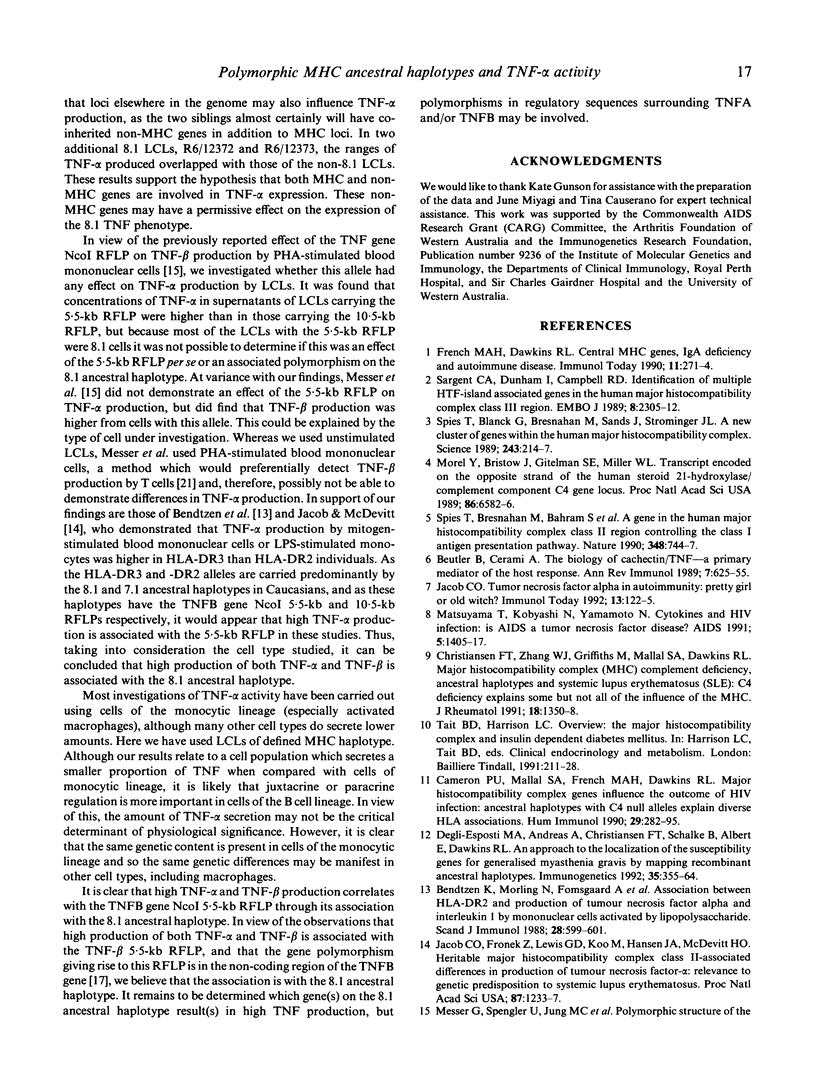Abstract
It remains unclear which MHC loci are involved in susceptibility to autoimmune diseases and immune deficiencies. We have chosen to evaluate whether different alleles of tumour necrosis factor-alpha (TNF-alpha) are important, as TNF has been implicated in the etiology of many immunological disorders. We have shown previously that a restriction fragment length polymorphism in the TNF region correlates with MHC ancestral haplotypes. We therefore examined the effect of ancestral haplotype on the activity of TNF-alpha in culture supernatants of lymphoblastoid cell lines. The results demonstrate that TNF-alpha activity in supernatants of 8.1 (A1, B8, DR3) cell lines was higher than that present in the supernatants from cells homozygous for eight different MHC ancestral haplotypes, and indicate that polymorphisms in TNF-alpha, or in other MHC genes that regulate TNF, may be responsible for the 8.1 phenotype.
Full text
PDF




Selected References
These references are in PubMed. This may not be the complete list of references from this article.
- Abraham L. J., Du D. C., Zahedi K., Dawkins R. L., Whitehead A. S. Haplotypic polymorphisms of the TNFB gene. Immunogenetics. 1991;33(1):50–53. doi: 10.1007/BF00211695. [DOI] [PubMed] [Google Scholar]
- Bendtzen K., Morling N., Fomsgaard A., Svenson M., Jakobsen B., Odum N., Svejgaard A. Association between HLA-DR2 and production of tumour necrosis factor alpha and interleukin 1 by mononuclear cells activated by lipopolysaccharide. Scand J Immunol. 1988 Nov;28(5):599–606. doi: 10.1111/j.1365-3083.1988.tb01492.x. [DOI] [PubMed] [Google Scholar]
- Beutler B., Cerami A. The biology of cachectin/TNF--a primary mediator of the host response. Annu Rev Immunol. 1989;7:625–655. doi: 10.1146/annurev.iy.07.040189.003205. [DOI] [PubMed] [Google Scholar]
- Cameron P. U., Mallal S. A., French M. A., Dawkins R. L. Major histocompatibility complex genes influence the outcome of HIV infection. Ancestral haplotypes with C4 null alleles explain diverse HLA associations. Hum Immunol. 1990 Dec;29(4):282–295. doi: 10.1016/0198-8859(90)90042-n. [DOI] [PubMed] [Google Scholar]
- Christiansen F. T., Zhang W. J., Griffiths M., Mallal S. A., Dawkins R. L. Major histocompatibility complex (MHC) complement deficiency, ancestral haplotypes and systemic lupus erythematosus (SLE): C4 deficiency explains some but not all of the influence of the MHC. J Rheumatol. 1991 Sep;18(9):1350–1358. [PubMed] [Google Scholar]
- Dawkins R. L., Leaver A., Cameron P. U., Martin E., Kay P. H., Christiansen F. T. Some disease-associated ancestral haplotypes carry a polymorphism of TNF. Hum Immunol. 1989 Oct;26(2):91–97. doi: 10.1016/0198-8859(89)90094-3. [DOI] [PubMed] [Google Scholar]
- Dawkins R. L., Zhang W. J., Degli-Esposti M. A., Abraham L., McCann V., Christiansen F. T. Genetics of diabetes. Studies of MHC haplotypes by pulsed field gel electrophoresis. Baillieres Clin Endocrinol Metab. 1991 Jun;5(2):285–297. doi: 10.1016/s0950-351x(05)80128-4. [DOI] [PubMed] [Google Scholar]
- Degli-Esposti M. A., Andreas A., Christiansen F. T., Schalke B., Albert E., Dawkins R. L. An approach to the localization of the susceptibility genes for generalized myasthenia gravis by mapping recombinant ancestral haplotypes. Immunogenetics. 1992;35(6):355–364. doi: 10.1007/BF00179791. [DOI] [PubMed] [Google Scholar]
- Degli-Esposti M. A., Leaver A. L., Christiansen F. T., Witt C. S., Abraham L. J., Dawkins R. L. Ancestral haplotypes: conserved population MHC haplotypes. Hum Immunol. 1992 Aug;34(4):242–252. doi: 10.1016/0198-8859(92)90023-g. [DOI] [PubMed] [Google Scholar]
- French M. A., Dawkins R. L. Central MHC genes, IgA deficiency and autoimmune disease. Immunol Today. 1990 Aug;11(8):271–274. doi: 10.1016/0167-5699(90)90110-u. [DOI] [PubMed] [Google Scholar]
- Green L. M., Stern M. L., Haviland D. L., Mills B. J., Ware C. F. Cytotoxic lymphokines produced by cloned human cytotoxic T lymphocytes. I. Cytotoxins produced by antigen-specific and natural killer-like CTL are dissimilar to classical lymphotoxins. J Immunol. 1985 Dec;135(6):4034–4043. [PubMed] [Google Scholar]
- Jacob C. O. Tumor necrosis factor alpha in autoimmunity: pretty girl or old witch? Immunol Today. 1992 Apr;13(4):122–125. doi: 10.1016/0167-5699(92)90107-i. [DOI] [PubMed] [Google Scholar]
- Matsuyama T., Kobayashi N., Yamamoto N. Cytokines and HIV infection: is AIDS a tumor necrosis factor disease? AIDS. 1991 Dec;5(12):1405–1417. doi: 10.1097/00002030-199112000-00001. [DOI] [PubMed] [Google Scholar]
- Messer G., Spengler U., Jung M. C., Honold G., Blömer K., Pape G. R., Riethmüller G., Weiss E. H. Polymorphic structure of the tumor necrosis factor (TNF) locus: an NcoI polymorphism in the first intron of the human TNF-beta gene correlates with a variant amino acid in position 26 and a reduced level of TNF-beta production. J Exp Med. 1991 Jan 1;173(1):209–219. doi: 10.1084/jem.173.1.209. [DOI] [PMC free article] [PubMed] [Google Scholar]
- Morel Y., Bristow J., Gitelman S. E., Miller W. L. Transcript encoded on the opposite strand of the human steroid 21-hydroxylase/complement component C4 gene locus. Proc Natl Acad Sci U S A. 1989 Sep;86(17):6582–6586. doi: 10.1073/pnas.86.17.6582. [DOI] [PMC free article] [PubMed] [Google Scholar]
- Sargent C. A., Dunham I., Campbell R. D. Identification of multiple HTF-island associated genes in the human major histocompatibility complex class III region. EMBO J. 1989 Aug;8(8):2305–2312. doi: 10.1002/j.1460-2075.1989.tb08357.x. [DOI] [PMC free article] [PubMed] [Google Scholar]
- Spies T., Blanck G., Bresnahan M., Sands J., Strominger J. L. A new cluster of genes within the human major histocompatibility complex. Science. 1989 Jan 13;243(4888):214–217. doi: 10.1126/science.2911734. [DOI] [PubMed] [Google Scholar]
- Spies T., Bresnahan M., Bahram S., Arnold D., Blanck G., Mellins E., Pious D., DeMars R. A gene in the human major histocompatibility complex class II region controlling the class I antigen presentation pathway. Nature. 1990 Dec 20;348(6303):744–747. doi: 10.1038/348744a0. [DOI] [PubMed] [Google Scholar]
- Tait B. D., Harrison L. C. Overview: the major histocompatibility complex and insulin dependent diabetes mellitus. Baillieres Clin Endocrinol Metab. 1991 Jun;5(2):211–228. doi: 10.1016/s0950-351x(05)80124-7. [DOI] [PubMed] [Google Scholar]


